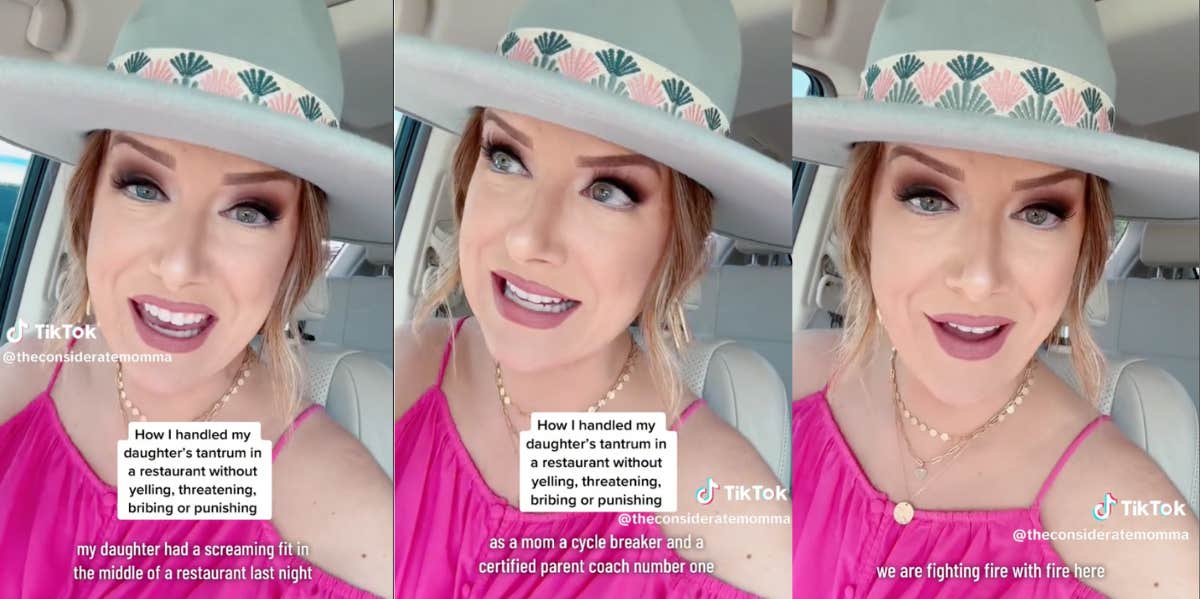Parenting Coach Reveals How She Handled Her Daughter's Intense Tantrum In A Restaurant While Ignoring Other Customer's Stares
Tantrums are a normal part of childhood, and how parents choose to respond to them can make or break the situation.
 TikTok
TikTok Mom Rachael Lynn Rogers is not only a parent, she’s also a certified parenting coach. In her TikTok bio, she acknowledges she is “not a perfect parent,” which is refreshing in an era where there are so many pressures on parents, including the mirror effect of social media, which makes many parents feel like they need to reach for perfection.
Rogers offers tools, coaching, and posts about parenting techniques on TikTok. She recently recorded a post in which she used an example from her own parenting experience to model how to manage kids having public tantrums. She captioned her post, “How I handled my daughter’s tantrum in a restaurant without yelling, threatening, bribing, or punishing.”
Rogers recounted a story in which her daughter had a tantrum in public and used her experience as a learning moment for other parents.
She explained, “My daughter had a screaming fit in the middle of a restaurant last night, right at the peak time where there are a whole bunch of people coming in, and this is what I did, as a mom, a cycle breaker, and a certified parent coach.”
“Number one, I kept myself calm, because an escalated parent cannot de-escalate an escalated child; we are fighting fire with fire here,” Rogers stated. “The second thing I did was try to calm her down inside the restaurant. That did not work. So up we went and out of the restaurant, while she was kicking and screaming.”
“Yes, there were a lot of eyes on me, but my focus was on my child in these moments. I had to train myself to not focus on the thoughts, feelings, and opinions of other people, but instead to focus on my child and what need is driving her unwanted behaviors,” she continued.
“So, we go outside. She’s kicking rocks, literally, kicking trees, not happy. And I keep saying, ‘Okay, I’m here and you are safe, I’m here to help you feel angry and not scream, kick, hit, throw, and all that stuff. I said, ‘Your body has a need right now, and when you’re ready, I’m here to help you figure that out. She keeps squealing and screaming, but she is de-escalating. I stay calm, and she continues to calm down little by little by little. “
"Finally, whenever I can tell that she is calm enough to have an actual conversation that involves logic and reasoning, I say to her, ‘I think what is going on here is that your body is really hungry. Is your tummy saying, feed me right now?’ And she said, ‘Yeah.’ And I said, ‘Okay. We’re gonna go back in. I’m sure our food is already at the table, and what are we not gonna do when we get in there?’ And she said, ‘scream.’ And we wound up having a great meal."
Rogers explained that she doesn’t discipline her daughter with punishments— she chooses to discipline differently.
“I know there's gonna be some people that are like, wait a second, you didn’t give her a consequence for screaming inside the restaurant, you’re just gonna go back and reward her with food, she needs a consequence to learn the lesson. But you see, in my home, I discipline through connection.”
“ I don’t yell, threaten, bribe, or punish to get my daughter to do what I want her to do, [because] I’m not looking for compliance. I’m looking for cooperation.
She offered context for her parenting decisions, saying that she doesn’t punish her daughter because she wants to raise her in a way that shows her that her emotions matter.
“I’m not interested in raising a people pleaser who feels the need to read the room and adjust her behavior or her emotions based on what she sees around her. I’m not interested in raising a fearful, obedient robot who thinks that she needs to comply with all of the demands placed on her, whether she thinks that it's right or not.”
Rogers wants to raise her daughter into “a morally sound, emotionally regulated, mentally stable adult, who knows how to effectively communicate and problem solve, without using fear, manipulation, aggression, or control.”
The American Psychological Association recognizes that learning to regulate emotions is a complicated process for kids to take on. They suggest offering connection, consistency, and comfort as a method to allow kids to develop secure attachments, which in turn allows them to feel protected. They also advise teaching children to recognize and name their emotions, though those conversations should occur when kids are calm, and not in the midst of a meltdown.
It takes a solid amount of emotional labor and emotional regulation for parents, themselves, to navigate moments when children are dysregulated. Tantrums are a normal part of a child’s development, and it’s up to parents how they choose to respond. Rogers shows that there is another route to take when kids have tantrums, which is to offer them a safe space to express themselves, with the hope that they learn from the experience.
Alexandra Blogier is a writer on YourTango's news and entertainment team. As a former postpartum doula, she covers parenting issues, pop culture analysis, and all things to do with the entertainment industry.

